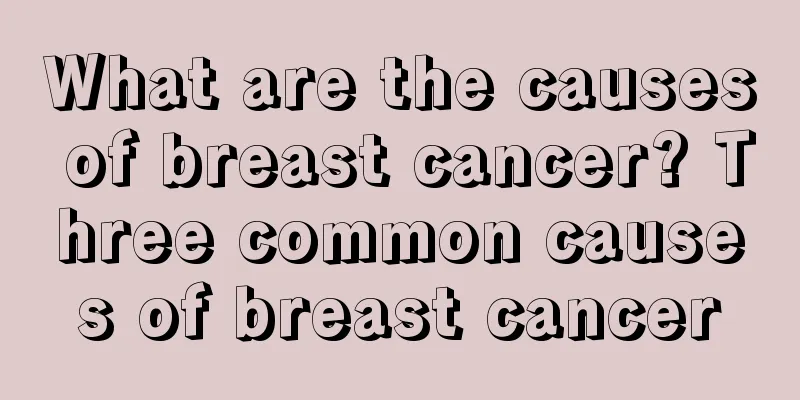What are the causes of breast cancer? Three common causes of breast cancer

|
Everyone knows that women are most afraid of breast cancer. Do you know the cause of breast cancer? Let's take a look. Nowadays, the probability of women suffering from breast cancer is getting higher and higher, and they still tend to be young women, which makes many female friends very taboo. In the face of such a malignant disease, we must always pay attention to the prevention and treatment of breast cancer. First of all, we should know what is the cause of breast cancer? What are the early symptoms of breast cancer? Causes of Breast Cancer Genetic factors Studies have found that if the mother has bilateral breast cancer before menopause, the risk of breast cancer is 9 times that of ordinary women, and the average age of second-generation breast cancer patients is about 10 years earlier than ordinary people. The risk of women with breast cancer among sisters is three times that of ordinary people. It should be emphasized that breast cancer is not directly inherited, but a "cancer predisposition". Relatives of breast cancer patients may not suffer from breast cancer, but they are more likely to suffer from breast cancer than ordinary people. Early menarche and late menopause The relative risk of breast cancer increases 2.2 times compared to those aged 12 years and older. The risk of breast cancer in those aged 55 and older with amenorrhea is twice that of those aged under 45. Early menstruation and late menopause are two major risk factors for breast cancer. Marriage and Childbirth Epidemiological studies have shown that although infertility or first child is also a disadvantage for women who get married after the age of 30, the risk of breast cancer in unmarried women is twice that of married women. Experts believe that childbirth has a protective effect on the breasts, but this only applies to people who give birth at full term before the age of 30. Studies in recent years have shown that breastfeeding has a protective effect on the occurrence of breast cancer, mainly in premenopausal women. Ionizing radiation The breast is a tissue that is more sensitive to the carcinogenic activity of ionizing radiation. When young, the breast is in the mitotic activity stage and is most sensitive to the carcinogenic effects of ionizing radiation. The effects of ionizing radiation are cumulative, and multiple small-dose exposures are as dangerous as a single large-dose exposure, which has a dose-effect relationship. Unhealthy eating habits The incidence and mortality of breast cancer are closely related to the amount of fat digested per capita. The high income of some company employees leads to high-level, unscientific and unhealthy "high-calorie, high-fat" eating habits, which greatly increases the incidence of breast cancer. Early Breast Cancer Symptoms Intraductal carcinoma Most of them occur under the nipple, around the areola and in the upper quadrant of the breast. In nearly half of the cases, local breast tissue hypertrophy of varying sizes or unclear states can be palpated. The mass is not attached to the skin. Some patients may feel tingling or discomfort. In some cases, the mass cannot be palpated. 25%~40% present with nipple discharge, especially papillary duct carcinoma. Nipple discharge is usually a precursor symptom. The discharge is mostly bloody or serous. More than 40% of cytological examinations can detect cancer cells, and 5%~25% of cases are complicated by nipple eczematous carcinoma. Lobular carcinoma in situ 1/4~3/4 are bilateral, which can occur in both breasts at the same time or successively in both breasts. Another feature is that the cancer focus is small in size and narrow in breast range. It can involve several breast lobules at the same time, or it can involve several peripheral ducts or alveoli in one or one lobule. Therefore, the cancer focus is small and scattered, with unclear boundaries with the surrounding area. Clinical examination cannot touch the breast mass, and the patient's subjective symptoms and signs are not obvious. Therefore, lobular breast carcinoma is often not easy to detect or misdiagnosed as lobular breast hyperplasia. Most clinically diagnosed cases are benign breast lesions before surgery, which are occasionally found by postoperative histological examination. Small breast cancer Most patients have no obvious clinical symptoms. Most of them are discovered by accident or suspected of benign tumors during cancer prevention surveys. Biopsy and diagnosis are performed. X-rays have important diagnostic value for breast microcancer. In recent years, the application of breast ultrasound diagnostic equipment can detect solid tumors as small as 5mm. The lesions are mostly in the outer quadrant or under the areola. The tumor rarely adheres to the skin. The texture is hard or tough, the border is clear or slightly unclear, and there is no obvious restriction on movement. A few people may have it on both sides at the same time, accompanied by enlarged axillary lymph nodes. Signs The incidence of intraductal carcinoma is mostly under the nipple, with thickening of tissues of varying sizes around the areola. Some cases have no lumps; 25% to 40% present with nipple discharge, especially bloody discharge. More than 40% of cytological examinations can detect cancer cells. Ductography and mammography are helpful for detection and diagnosis. |
>>: What are the misconceptions about breast cancer? Five causes of breast cancer
Recommend
Panax notoginseng pearl powder and honey as facial mask
Many women who love beauty often apply facial mas...
Can melanoma be cured
Melanoma is a tumor caused by melanocytes in the ...
Thyroid ft3 is low
The changes in thyroid Ft3 and TSH must be observ...
The fastest way to sober up
Nowadays, people cannot do without drinking or di...
What should I do if I have an itchy throat and dry cough
Dry and itchy throat makes many people feel uncom...
Why do I sweat when I drink water in summer?
In life, all humans and animals cannot live witho...
What is the function of dragon bone flower
Dragon bone flower is a common plant. Most people...
Experts introduce 4 treatments for advanced colon cancer
There are more and more patients with colon cance...
What tests should kidney cancer patients undergo?
The chief complaints and clinical manifestations ...
Specific explanation of the causes and treatment of snoring
If a person snores while sleeping, it means that ...
Experts talk about how to prevent and treat fibroids
Experts talk about how to prevent and treat fibro...
Will hyperthyroidism affect the intelligence of the fetus? What to do if you have hyperthyroidism during pregnancy?
During pregnancy, if the mother's resistance ...
What should I do if I have tinnitus in my ears
Simply put, tinnitus is a buzzing feeling in the ...
What are the dangers of gum scaling
People's oral cavity may often have various p...
What are the mid-stage symptoms of gastric cancer? There are these three symptoms
Gastric cancer is a very common tumor disease at ...









